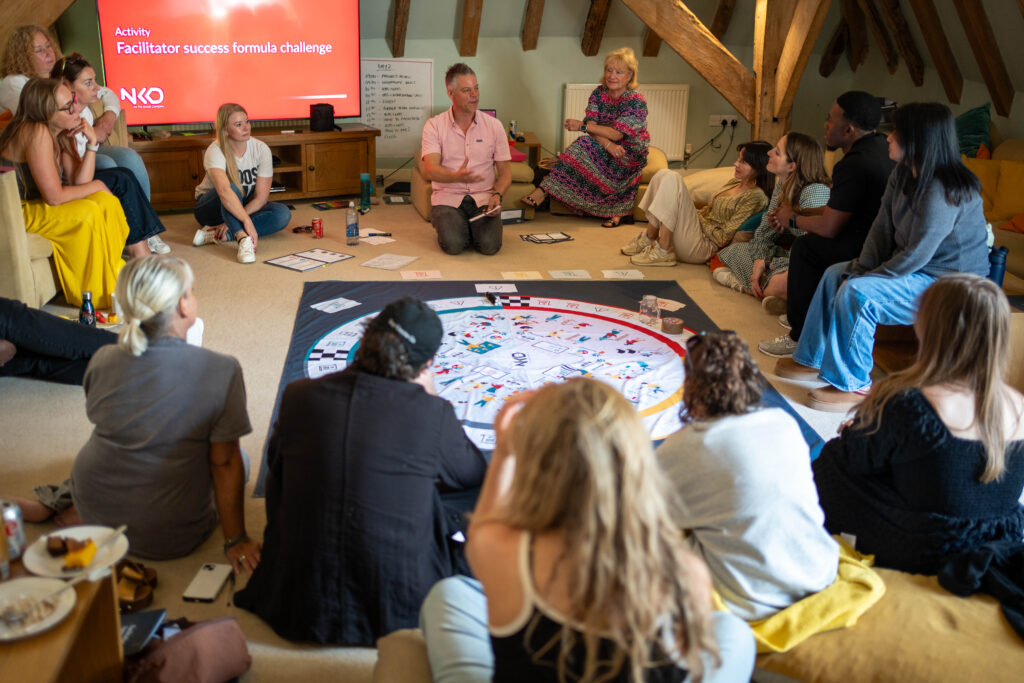In high-performing workplaces exceptional leaders need to guide and inspire people, deliver information with flair and empathy, foster collaboration, draw out creativity, and drive productive problem-solving.
It’s a lot to master, but these skills are taught when people learn to become effective facilitators. In our client work, we’ve seen facilitation skills become a total game changer for businesses.
What are facilitation skills?
At its core, facilitation skills involve learning to guide a group to achieve their goals by making processes simple, and building a productive and open environment for learning and collaboration. Facilitators help people to have meaningful conversations. They learn how to support people in reaching agreements, navigating conflicts, and adding structure to group learning. Unlike other group leaders – like teachers or instructors – facilitators learn how to remain neutral, enabling and empowering their group to work together effectively and to make team decisions.
“A facilitator can be compared to an orchestral conductor. They are not giving direct orders because everyone already knows what to do. However, the conductor ensures that the entire performance goes smoothly and harmoniously.”
Why teach facilitation skills?
Having a team of exceptional in-house facilitators enhances overall team performance and has a big impact on the wider business.
- Many employees use facilitation skills daily
In her new book, The Facilitation Advantage, Therese Miclot discusses how facilitation opportunities regularly arise in a working day. “Think about the team leader running the weekly meeting, the engineer navigating a tricky challenge with their peers, the account manager pitching to clients, or the CEO discussing strategies with the Board of Directors.” Many employees can benefit from facilitation training as a part of their professional development and management skill set.
2. Teams flourish with effective facilitators to guide them
Equipping employees with facilitation skills can transform team dynamics. By leading discussions effectively, employees create an inclusive environment where diverse contributions are valued, boosting morale and a sense of belonging. These skills also help resolve conflicts and promote understanding across diverse groups, fostering an environment of inclusion among employees from various cultures with diverse skills and learning styles. Done well, effective facilitators can improve their colleagues’ job satisfaction and reduce staff turnover by making everyone’s voices heard.
3. Facilitators learn to create psychological safety within teams
Studies by McKinsey in 2021 showed that just 26 percent of leaders create psychological safety for their teams. When learning facilitation skills, people learn to create safe spaces for team members to share ideas, ask questions, and admit mistakes without fear.
4. Facilitation skills help build high-performing businesses thrive
Facilitation skills enhance both individual and team performance, benefiting the entire business. Having in-house facilitators ensures continuous reinforcement of learning. Whether delivering complex ideas, implementing company-wide changes, or embedding new processes, these facilitators are equipped to engage and support employees effectively.
How NKD can help
We specialise in upskilling in-house facilitators to deliver high-quality meetings, learning programmes, and workshops. Our facilitator success formula combines knowledge, action, and personal development to create transformative learning experiences. We offer tailored training for managers, workshop leaders, and anyone needing facilitation skills, ensuring they can lead effectively and foster a collaborative culture.
If you’re interested in learning more about how NKD can support your employee’s facilitation skills development, visit our Facilitation Skills and Train the Trainer page or get in touch for a chat.
